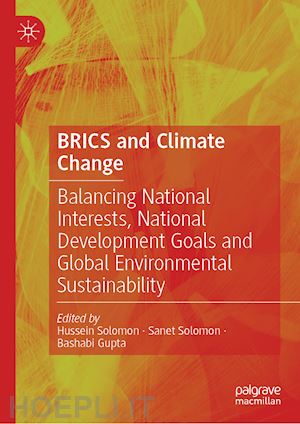
Questo prodotto usufruisce delle SPEDIZIONI GRATIS
selezionando l'opzione Corriere Veloce in fase di ordine.
Pagabile anche con Carta della cultura giovani e del merito, 18App Bonus Cultura e Carta del Docente
This book delves into the intricate interplay between climate change and the dynamic shifts in global power structures, focusing on the expanded BRICS. Offering a distinctive vantage point by encapsulating the evolving dynamics of Brazil, Russia, India, China, and South Africa, the book through this unique perspective, sheds light on the nuanced relationship between environmental challenges and the geopolitical landscape. It has an interdisciplinary approach, seamlessly weaving insights from political science, economics, development studies, and the natural sciences. This holistic integration of diverse disciplines enhances the reader's understanding, presenting a comprehensive analysis of the multifaceted issues at the nexus of climate change and global politics. It not only maps out the current climate crisis confronting humanity in the twenty-first century, but also extends a helping hand to policymakers. The inclusion of pragmatic policy recommendations adds a pragmatic dimension, providing valuable insights that policymakers may find instrumental in addressing the challenges posed by climate change.
Chapter 1: Introduction.- Chapter 2: Growing in Harmony with our Cosmic Selves: A Holist Answer to the “No Technical Solution Problem” of Climate Change.- Chapter 3: Bridging the Gap: The Brazilian Climate Change Agenda after Bolsonaro.- Chapter 4: Between Geopolitical Ambition, Energy Nationalism and Capacity Deficit: Russia’s Thorny Relationship with Climate Change.- Chapter 5: Intersecting Priorities: India’s Approach to the Politics of Climate Change – Domestic Development and Global Commitments.- Chapter 6: China’s Evolving Climate Change Strategy: A Dual Role in Mitigation and Adaptation.- Chapter 7: South Africa’s Commitment Towards Climate Security and a Just Transition.- Chapter 8: BRICS Plus and Climate Change.- Chapter 8: BRICS Plus and Climate Change.- Chapter 10: India–Africa Cooperation: Joint Engagement in Adaptation to Climate Change.- Chapter 11: Conclusion.
Dr. Hussein Solomon is Senior Professor in the Centre for Gender and Africa Studies at the University of the Free State, South Africa. He was previously Head of Department of Political Studies and Governance, University of the Free State. His most recent book was African Security in the Anthropocene (with Jude Cocodia), Springer 2023.
Sanet (née Madonsela) Solomon is a lecturer in the Department of Political Sciences at the University of South Africa, a seasoned political analyst, and internationally published author. Her latest publication is a book chapter titled Climate-Security and the Anthropocene: The Case of Mali.
Dr. Bashabi Gupta, a Professor at the Department of Geography, Miranda House, University of Delhi, specializes in social theory in technology landscapes and climate change policy. Her research spans sustainable livelihoods, gendered adaptation, India-Africa relations, and natural resource management. Awarded multiple fellowships, including the Felix Scholarship, CSDS ICSSR Doctoral fellowship, and NRTT ICSSR Post Doctoral fellowship. She has published extensively and presented her work globally.











Il sito utilizza cookie ed altri strumenti di tracciamento che raccolgono informazioni dal dispositivo dell’utente. Oltre ai cookie tecnici ed analitici aggregati, strettamente necessari per il funzionamento di questo sito web, previo consenso dell’utente possono essere installati cookie di profilazione e marketing e cookie dei social media. Cliccando su “Accetto tutti i cookie” saranno attivate tutte le categorie di cookie. Per accettare solo deterninate categorie di cookie, cliccare invece su “Impostazioni cookie”. Chiudendo il banner o continuando a navigare saranno installati solo cookie tecnici. Per maggiori dettagli, consultare la Cookie Policy.